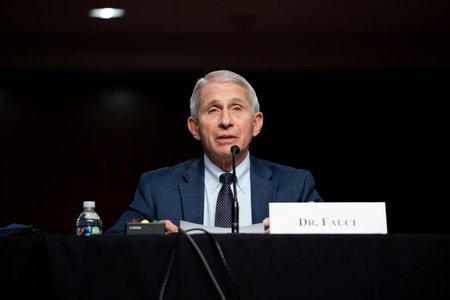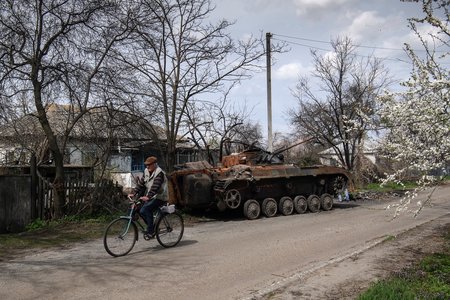With Russia's invasion of Ukraine now in its tenth week, Russian missiles struck Kyiv as the U.N. secretary general was visiting. That came amid fears the war could expand beyond Ukraine’s borders. Russian President Putin warned the West that any outside interference in the conflict would be met with a quick response, while President Biden asked Congress for $33 billion more in aid for Ukraine.
Clip: Biden requests billions to aid Ukraine as Putin warns West about interfering in the war
Apr. 29, 2022 AT 5:14 p.m. EDT
TRANSCRIPT
Notice: Transcripts are machine and human generated and lightly edited for accuracy. They may contain errors.
Alcindor : Good evening and welcome to "Washington Week."
Russia’s invasion of Ukraine is now in its 10th week, and overnight, missiles hit the capital city of Kyiv as the U.N. secretary general was visiting. Russia claims it destroyed arms factory, but Ukrainian officials say a residential building was hit. That comes as growing fears are really expanding because the war could expand beyond Ukraine’s borders.
On Wednesday, Russian President Vladimir Putin warned the West that any outside interference in the conflict could be met with a lightning fast response.
(BEGIN VIDEO CLIP)
Vladimir Putin, Russian President (through translator) : If someone intervenes in events, they should know that our response to counter strikes will be immediate, quick. We have all the instruments that no one could brag about.
(END VIDEO CLIP)
Alcindor : And on Thursday, President Biden requested an additional $33 billion from Congress to help Ukraine.
(BEGIN VIDEO CLIP)
Biden : The cost of this fight is not cheap but caving to aggression is going to be more costly if we allow it to happen. As long as the assault and atrocities continue, we’re going to continue to provide military assistance.
(END VIDEO CLIP)
Alcindor : Joining me tonight to discuss this and more, Michael Shear, White House correspondent for "The New York Times," and here with me in studio, Nikole Killion, congressional correspondent for CBS News, and Hans Nichols, political reporter for "Axios".
Thank you so much all for being with me on what is a busy night in Washington. You are all partying with us at this table.
Michael, I want to start with you. Overnight, there was news that broke that Russia had sent a missile -- hit a missile to Kyiv, of course, the capital city of Ukraine. That came as the United Nations secretary general was visiting, as we noted. That also came after the U.N. secretary-general was meeting face to face with Putin just a couple of days before.
I wonder what you make of the significance of this attack happening and the timing of it.
Michael Shear, White House Correspondent, THE NEW YORK TIMES : Well, look, I think it underscores what has been pretty true for the last several weeks, at least in the United States in Washington, but in capitals across Europe and elsewhere, which is that this war is not ending any time soon. To the extent that Vladimir Putin pulled out of the areas around Kyiv and is focusing his attention on the south and east of the country of Ukraine, that was really a reflection of how poorly his forces had done in its attempt to capture the entire country, but if by no means, I think, signifies that this is about to end.
And, you know, I think one of the things Putin is particularly good at is sending reminders that this is not over, that he’s not done. That he -- you know, for all of the poor performance of his military, that they still have lots of capabilities to inflict pain. You know, perhaps they will be able to seize a good chunk of Ukraine on the east, but even if they are not able to do that, their weaponry allows them to inflict damage as far as they want across the country, if its in the north, in Kyiv, in the west, or in the east.
So, you know, I just think it’s -- it underscores that reality and, you know, helps to explain why the allies, the United States and others, are bracing and requesting and finding more and more resources to supply to Kyiv and to Ukraine because they know it is not about to end soon.
Alcindor : Certainly. And when you think about it, you’re talking about this idea that the war is certainly not going to be over any time soon.
And in some ways, Hans, I want to come to you because the defense secretary raised some eyebrows or really raised my eyebrows when he said that the U.S.’s goal here, what it wants to see is Russia’s military capabilities weaken. I wonder what your reporting reveals of sort of the proxy war that’s going on right now.
Hans Nichols, Political Reporter, AXIOS : Well, it’s very clear that the administration is being very deliberative about talking about Russia’s battlefield losses and what is actually happening on the ground. There’s almost a cadence to what is happening where we have the nightly briefing from Zelenskyy in Ukraine and every other day, you get a deep Pentagon debrief on just narrating what’s happening in the war and narrating it in a way that does not cast Russia in a great light.
It seems as though this is sort of the one-to punch in terms of the internal bolstering the people from Zelenskyy and externally what you’re getting from the U.S., the warnings to Putin, the messaging to Putin, but it does seem strong, and it does seem unique. And as Michael is noting, the Russians still have some cards to play. They have a lot of capabilities, and as we all know, there are some scary capabilities out there.
Alcindor : And there are some who are wondering whether or not this -- if all that is happening at the administration might be moving closer to direct conflict with Russia. What’s your reporting reveal about that?
Nichols : There is still a red line there of actual direct conflict, but let’s just look at where it shifted, right? I mean, remember the debate in the Obama administration, no lethal weapons. Well, that seems like it was decades ago, right? Five, six years ago, now, we’re all onboard with actual lethal weapons.
The president of the United States, a Democratic president, is going to a defense contractor Lockheed Martin, to watch Javelins coming off the assembly line, or where they build Javelins, right? That is a little bit stronger than just plain rhetoric. Think of the images and backdrop of that.
And this is a White House that wants to -- as you just heard the president talk of that, they want to spend money, they’re prepared to spend whatever it takes. In this context, guys, $33 billion is a lot of money. That -- I mean, you look at four military sales to Israel, I think it’s the highest out there, it’s about $3 billion a year. This is 10 times that and maybe even more compressed timeframe. So, a lot of money and a clear signal of intent they want to be in this for a long haul.
Alcindor : Yeah. Nikole, Hans described $33 billion is a lot of money. It is, of course, a lot of money. What’s Congress and lawmakers there -- how do they see this request from the White House? Is there support there?
Nikole Killion, Congresional Correspondent, CBS NEWS : Well, at this point, it seems there will be bipartisan support from both Democrats and Republicans. You know, I did have a chance to talk to Congressman Michael McCaul, who sits on the House Foreign Affairs Committee, a ranking member, and asked him, is this figure eye-popping to you, because that’s what some Senate Republicans have said, and he said, look, you know, we got to go through this package, but he feels strongly that Ukraine needs all the military might it can get.
And, of course, Democrats, too, want to move forward with this package as soon as possible. Majority Leader Chuck Schumer says he plans to make it a priority.
Nichols : And there’s also some economic assistance as well, right? I think there number for direct military assistance in the $20 billion range, some economic assistance, some food security. So it is not all military, but again, it is the broader point, and that is that they want to bolster the government and make sure the Ukrainian people have what they need to survive, endure, and hopefully succeed.
Alcindor : And, Nikole, you talk about Schumer, Senator Schumer, of course. There’s some talk the Democrats want to tie this to COVID. We’re going to get a whole block on COVID, but just talk a little bit about what the challenges could be there and how much of a gamble it might be for Democrats.
Killion : Well, I was going to say, the devil is in the detail, it’s not so much this package, but really how they get it done. We have seen, especially when Democrats try to link packages in the past, it has not been so successful and --
Alcindor : Just putting it lightly, yes.
Killion : Mildly. But, you know, this time potentially could be no different. Republicans are certainly balking at the idea of tying the Ukraine funding to COVID funding, and really the premise behind this for Democrats is the administration has been clear that they also want this COVID really funding passed. That this will help for future pandemic. It didn’t succeed before the recess. So, they want to bring it up again.
And just today, Speaker Pelosi said she does believe that they should be tied together. So, this is something that could potentially bug both packages down.
Alcindor : And, Michael, the White House has indicating that this money -- this $33 billion would last five months. I think that’s obviously at the end of the fiscal year, but that’s also a lot of money. What’s your sense Inside the White House, what is your sense of what is motivating officials to make this ask to Congress?
Shear : I think -- I think it’s two things, right? On the substantive side, I think they recognize that the war will be over soon. So, you don’t want to be in a position of having to go back to Congress over and over again with a bunch of small asks if you know or think that it will be a costly endeavor that is going to last a long time.
I also think this is all playing out in a political context. It is an election year. You know, I think President Biden wants to be seen as solid and determined on an issue that does have bipartisan support. There is a lot of support across the aisle for Ukraine and for not letting them falter in the face of the Russian invasion.
And, you know, I sort of second Hans’ mentioning of the trip next week to the plant where they make these Javelin missiles. I mean, it is remarkable that that is a trip that this president is going to take. He never wanted to make a trip like that.
This is a president who wanted to spend the next several months before the election focused on the economy, focused on job creation, on the so-called bread-and-butter issues that American people care about. You know, the fact that he is going and doing this photo op tells you all you need to know about where he thinks he needs to position himself politically at this moment.
Alcindor : It’s certainly going to be striking when we see President Biden next week in Alabama.
I want to talk you, Hans, because even as the American people say they want to talk about red and butter issues, there is the Russian foreign minister who is saying specifically that the more that the West they say meddles, of course, the West would say -- helps Ukraine, the more there is the risk for nuclear war. Did you talk to your sources -- national security officials?
Nichols : Yeah.
Alcindor : How concerned are they about it?
Nichols : It’s troubling. And you -- I mean, I wish I had a better barometer for talking to national security officials for how concerned they are because they toss around phrases that troubled me, if I am kind of honest about it, right? And you talk about the potential for chems, for nukes, for tacticals, and just the ease with which officials are, especially the former side, they’re tossing these terms around makes you think that this is quite serious, right?
I mean, no one -- none of us know what moves Putin is going to make. We are in a difficult position here, and it is troubling when anyone threatens and that’s what -- let’s very clear what’s happening. They are threatening to use weapons of mass destruction.
They can hide behind caveats, but they know exactly what their intent is. And that to me seemed significant.
Alcindor : That is absolutely significant.
Killion : I was going to say, even Senator Lindsey Graham, who is always very hawkish, said in an interview this week that he thinks that a nuclear strike could be a possibility or that the Russians may be contemplating that. We do not know if there is intelligence to necessarily back that up, but we know there is concern among members of Congress as well, and the implications.
Alcindor : And to think about something -- thinking about these concerns, not only now as I listen to Hans sort of scare me about nuclear weapons and what could happen there.
Nichols : Yeah, look, I don’t -- I mean, I obviously do not have a roadmap to Vladimir Putin’s mind. I don’t know what their intent. It could be some strategic bluffing taking place, it could be a whole host of things. There are people much smarter than I at the Pentagon who have Putin’s psychological profile. They have excellent intelligence.
I mean, one thing that we sort of learned about this entire process is that most of the intelligence, at least the predictive on what Putin was going to do has been accurate. So there should be a fair -- you know, some acknowledgment of that. Look, I mean, you have conversations with Lindsey Graham, I mean, people are just sort of talking about it as though this is a real possibility, and then I don’t know how quickly Lindsey Graham pivoted to other issues, but it seems like a moment when you have Democrats and Republicans on Capitol Hill even entertaining this. And I think it tells us where we are.
I mean, I don’t know what they’re saying in the hall ways. You spend all your time down there, what you’re picking and just kind of sidebar conversations.
Killion : I think it remains a concern, ands, you know, for all the reasons you explain. You always have to be prepared for that worst-case scenario. And I think whether it’s the Pentagon, whether if it’s the Hill, whether it’s the administration, you know, you have to be prepared for the worse.
Hopefully, it does not get to that point, but certainly, it’s clear Russia is not done, that they could escalate things, especially with this symbolic victory day coming up in just another week or two.
Alcindor : Yeah. And, of course, now -- go ahead, Michael.
Shear : Really quickly, the one thing I would caution so listeners do not get totally panicked is that the U.S. military, the allies, they have not changed our own nuclear posture, right? Which would be -- you know, you don’t have the sense that any on this side have actually taken fundamental steps to change the military readiness vis-a-vis nuclear weapons, which gives you some indication that it is not as imminent as, you know, people might think.
Alcindor : Certainly.
!FROM THIS EPISODE


Clip: Biden moves to end Title 42 amid backlash on Capitol Hill over migrant surge


Clip: Vice President Harris catches COVID as Fauci clarifies comment on state of the pandemic


Full Episode: Washington Week full episode, April 29, 2022

© 1996 - 2026 WETA. All Rights Reserved.
PBS is a 501(c)(3) not-for-profit organization
